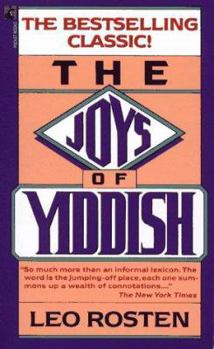Joys of Yiddish
Select Format
Select Condition 
Book Overview
A Relaxed Lexicon of Yiddish, Hebrew and Yinglish Words Often Encountered in English, Plus Dozens That Ought to Be, with Seredipitous Excursions into Jewish Humor, Habits, Holiday, History, Religion... This description may be from another edition of this product.
Format:Mass Market Paperback
Language:English
ISBN:067172813X
ISBN13:9780671728137
Release Date:January 1991
Publisher:Pocket Books
Length:534 Pages
Weight:0.60 lbs.
Dimensions:1.0" x 4.2" x 6.8"
Customer Reviews
6 ratings
Fun way to learn and comical
Published by Laura B , 5 years ago
Learn by reading stories rather than businesslike definitions. Very cool way to learn and funny. A classic book.
The Joys of Yiddish
Published by Thriftbooks.com User , 14 years ago
If you are curious about the evolution American English and have a robust sense of humor, you must have this book. In his introduction, the author clarifies that this book is about the English language, emphasizing contributions to English from Yiddish. Having your copy at hand, so you can look up the Yiddish words as you hear them will reveal another layer of humor in any Mel Brooks movie. When I acquired my first copy 25 years ago, I found that by just flipping pages and reading what grabbed my eye at the moment, I'd quickly find something profoundly interesting, something uplifting, and something hilarous, all within ten minutes.
little old guy
Published by Thriftbooks.com User , 14 years ago
Helpful when just the right word or term is needed. And full of humor.
A JOY OF A BOOK
Published by Thriftbooks.com User , 22 years ago
THE JOYS OF YIDDISH is a delightful little dictionary of Yiddish words and expressions that have worked their way into the English language, or at least should have. I can't count the times I've heard people with no background in Yiddish use words like "mavin" (expert), or "shnuk" (a real pitiful character), or dozens of others.Rosten's frequent approach is to take a word or expression, explain its pronunciation, define it as nearly as is possible, and give an anecdote or example of its use. When the word lends itself to humor, Rosten usually opts for a humorous anecdote.For an example, I've chosen the word "chutzpah." It is pronounced to rhyme with foot spa, with the ch rolled in your throat to give the German gutteral "kh" sound, not like the ch in "choo-choo." The nearest you can come to defining "chutzpah" in English is unmitigated gall or perhaps brazen effrontery. An example of "chutzpah" is the man who, after killing his mother and father, asks the court for mercy because, after all, he IS an orphan.There are hundreds of such examples in the book. There are also many more serious examples of words that do not lend themselves to humor.At the end of the book there are appendices which discuss Jewish Traditions, Ceremonies, Religious Writings, Names, and more.Rosten has evidently done his research to come up with the many hundreds of entries in the book. He has provided a valuable research document and a book that can be opened to almost any page and elicit a chuckle or two.
Top Fun
Published by Thriftbooks.com User , 24 years ago
You can learn a lot more with humor than by dry explanations alone. Rosten's classic is packed with Jewish wit, backed by solid linguistical and historical facts that explain, in a nutshell, how much common Yiddish came into existance. Only drawback: the "hardback" is really just a bigger paperback!
A Most Authoritative Book
Published by Thriftbooks.com User , 25 years ago
The most authoritative book on Yiddish expressions (for general readers) is Leo Rosten's "The Joy of Yiddish." It not only catalogues and defines Yiddish expressions and words, but contains illustrations and jokes that use Yiddish words.






